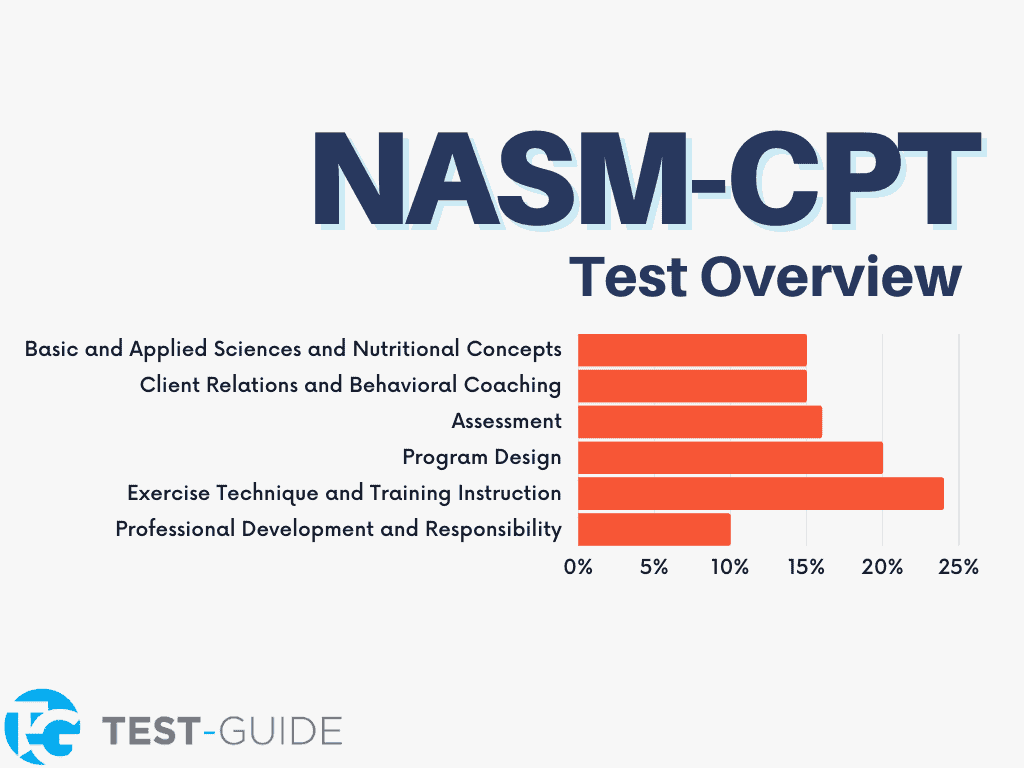Personal trainers who are looking to become certified will have to take the NASM-CPT test. The National Academy of Sports Medicine has developed this test as a way to ensure that candidates have the right skillset and knowledge. CPT stands for certified personal trainer.
This guide will walk you through several steps to boost your odds of passing this test while also showing you some NASM practice tests and other useful resources.
Summary: Prepare for your NASM exam with free NASM practice tests and other resources below.
NASM Practice Tests and Resources
| Resource | Notes | Provider |
| NASM Practice Test 1 | 20 questions for the NASM-CPT exam. | Varsity Tutors |
| NASM Practice Test 2 | 10 questions for the NASM-CPT exam. | Varsity Tutors |
| Official NASM-CPT Study Guide | 49 page study guide that reviews various topics that will be tested. | NASM |
| NASM Flashcards Set 1 | Review 200+ flashcards to prepare for the exam. | Quizlet |
| NASM Flashcards Set 2 | Review 130+ flashcards to prepare for the exam. | Quizlet |
NASM-CPT Test Overview
Candidates get two hours to complete the NASM-CPT exam, which is comprised of 120 questions. You will not be allowed to bring any references, phones, or other devices into the testing facility.
The NASM is administered on a computer by an independent contractor called PSI, which has testing facilities across the United States, Canada, and around the world.
The content used in the NASM is determined by a group known as the Professional Examination Service (ProExam). Their main goal is to ensure that candidates possess the knowledge and skillset required to be certified in CPT.
As a result, you can expect the NASM to be set up in the following format:
| Domain | Percent of Exam |
| Basic and Applied Sciences and Nutritional Concepts | 15% |
| Client Relations and Behavioral Coaching | 15% |
| Assessment | 16% |
| Program Design | 20% |
| Exercise Technique and Training Instruction | 24% |
| Professional Development and Responsibility | 10% |
There will be a number of sub-topics that fall under each of these categories but this will change from test-to-test depending on the ProExam specifications. Now let’s take a closer look at each of these domains.
Basic and Applied Sciences and Nutritional Concepts
This category will test the candidate’s understanding of human anatomy and how exercise, bioenergetics, and metabolism affect all of the body’s functions.
Candidates will need to understand the impact on all systems in the body including nervous, muscular, digestive, cardiorespiratory, and skeletal. That’s just the beginning too as more advanced knowledge is tested here.
Candidates must possess advanced knowledge of biomechanics, movement, and the principles of nutrition so that they are able to create a dietary plan based on a number of factors that will be different for everyone.
In summary, certified CPT’s must have the ability to create both exercise and diet plans based on a person’s unique needs. This requires a deep understanding of the human anatomy and how these items affect it.
Client Relations and Behavioral Coaching
CPT professionals are expected to carry a persona of professionalism so this section tests their understanding of client relations. Certified coaches will have to help clients develop lifestyle changes so they need to have a firm understanding of what this entails.
Expect questions related to client communication, listening, SMART goal development, and psychological reactions to exercise programs.
CPT professionals must be able to not only tell a client what changes they need to make, but understand the psychological effects that the client will experience.
Assessment
Assessment will test a candidate’s knowledge and ability to perform the necessary assessment so that they are able to develop fitness routines for their clients.
This falls in line with some of the applied science concepts and will test specific items like postural, speed, agility, body composition, physiological , and strength assessments. It dives even deeper by ensuring that licensed coaches are able to identify when a client might need a referral due to being out of scope.
Candidates must be able to use medical history, questionnaires, and general assessments to determine these needs.
Program Design
This category will test a candidate’s skillset in regards to using assessments to design exercise programs for a specific client. So expect questions that detail a type of person and then asks which program would fit their individual needs.
For instance, one type of individual might require resistance training while another would require cardiorespiratory training. Understanding the previous two categories is essential to understanding this part of the test.
Make sure you have a firm understanding of the following types of training:
- Flexibility
- Resistance
- Cardiorespiratory
- Core
- Balance
- Plyometric
- Speed Agility Quickness
Candidates will see questions related to all types of physical training and how they can be reflected in a program.
Exercise Technique and Training Instruction
Safe and effective exercises are essential knowledge for a CPT so this category of the exam will put that to the test. Exercise techniques, training methods, and safe practices will all show up here.
In short, candidates are tested on their ability to understand the nuances of safe exercises and how to apply those to specific clients. For instance, CPT practitioners are expected to understand warming up, kinetic chain checkpoints, and proper spotting techniques.
Professional Development and Responsibility
Finally, we come to the professional side of the coin. The NASM-CPT exam will test a candidate’s understanding of business practices. You can expect questions related to the following topics:
- Business Basics
- Marketing Practices
- Sales Methods
- Business Development
- Maintenance Practices for Equipment
- Proper Use of Credible Health and Fitness Resources
- Business Ethics
These questions are going to be geared toward CPT but the basics of businesses are the same across most industries.
NASM Test Administration
Candidates looking to take the NASM must be 18 years of age and have a high school diploma. Under certain exceptions, 17-year-old graduates might be given allowance to take the test as long as their 18th birthday falls within 90 days of the test date.
It’s also possible to take the test with a GED or other accepted high school graduate equivalent.
Additionally, candidates must have a certification card in CPR and AED and these certifications must include hands-on training in order to be considered. Approved provides include the American Red Cross and American Heart Association.
NASM-CPT Scoring
Exams are scored right away so candidates will know their results before leaving the testing facility. If you pass this exam, you are allowed to use the title of “NASM Certified Personal Trainer.”
There are 120 questions and an additional 20 research questions that don’t count in the scoring of the test. As usual, candidates won’t know which 20 questions are for research though.
Candidates must answer at least 70% of questions correctly in order to pass.
NASM FAQs
How difficult is the NASM?
This is quite a difficult question to answer because there are people who swear that this exam is easy and others who have failed it multiple times.
According to statistics released by PtPioneer, in 2018 9,550 candidates failed the NASM out of a total of 27,665 who took the test. That’s approximately 33%. Based on that, we can say that the NASM is quite difficult.
In fact, the NASM is known for being one of the most difficult tests in the entire industry. This is intentional so that individuals who get certified are regarded in a higher standard.
Don’t let this failure rate scare you though because the NASM is a prestigious certification and preparation will greatly improve your chances of passing.
How is a NASM practice test different from the real test?
A NASM practice test is written by individuals who don’t actually work for NASM so they are compiling information based on experiences. These practice tests are close, but there is no way to ensure 100% accuracy since the NASM changes rapidly from test-to-test.
Therefore, you won’t find NASM practice tests that exactly match the real thing, but that shouldn’t deter you from using them as a study method.
Not only are the questions rotated out every test, but they also change the wording. But it makes sense because people would figure out a static test within months, so they need it to be changed to improve legitimacy.
With that said, taking an NASM practice test will help prepare for the real exam since it still tests your knowledge of the material.
What will happen to candidates who fail the NASM exam?
Retesting costs $200 so it can start getting quite expensive if you fail multiple times. There are also test packages that actually come with a free retesting voucher so pay attention when buying the initial testing package.
After failing the exam, candidates must wait a full week before being allowed to retake the test so use that time to study even harder.
Candidates who fail a second time will have to wait a full month before being allowed to take the test again. Failing three times requires you to wait a full year to retake the test.


